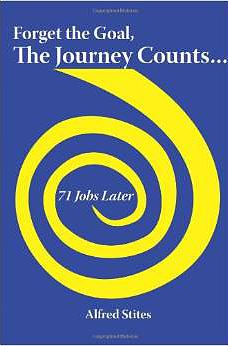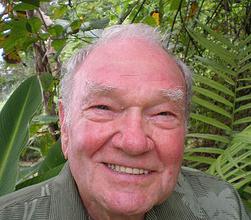Excerpt from Forget the Goal, the Journey Counts (Stites): Foreword

Foreword
For most Americans, their lives center around the job they have. Strangely, it is the job that defines most people. When two strangers meet, one of the first questions invariably asked is, “What do you do?” Most people take a job because it pays well and has strong benefits such as health coverage. Most of the time the job they have is not what they would really like to be doing. Most people are working to have enough to retire some years or decades later or are working toward a goal they have set for themselves because someone said having a goal is very beneficial.
This book is about my taking the jobs that came along because I wanted to do the work, not because of anything that came with the job. I did what I wanted to do and sometimes refused jobs that had a big salary, stock options, health plan, perks of homes and travel, but were not what I would like doing. I could never see why anyone would spend two-thirds of their life essentially working to make money, not work at what they really wanted to do—like playing the violin, working their way around the world, studying nuclear physics, or making small end tables out of coca bola wood.
Most people work at a job or have chosen a career because they, along with virtually everyone else in the past 50 years, have been injected with the toxin of fear. Fear of the future, plain and simple. People work to pile up as much money as possible, thinking that will get them through their old age in comfort. It rarely does, and they will have spent their entire adult life not doing what they really would have liked to do.
This book is about living positively, without concern for the future; it is about doing what you want to do. My observations for a fulfilling life are simple: Working to make a lot of money is a very unhealthy way to live. Live for the journey, forget about the goal! Anyone can learn anything and do anything if he or she really wants to.
Those tenets were arrived at early in life—experiencing the worst in poverty and overcoming what the Great Depression laid on everyone taught me which values are the important ones. I have long believed that we learn only through our troubles and failures. Once we get through them, we can accomplish anything.
I gained wisdom through experience and always allowed “happenstance” to guide me because I always wanted to learn something new. In many of my jobs I had no experience in the work required, and so my learning has continued over a lifetime.
If you wonder how I could get a job with no experience, think about saying, “I’ll work at half salary until you decide I am worth it to you.” I have done that and quickly made an impression. I once got a job saying I would work for nothing until I learned the work.
One of my “wisdoms” is: Laughter is an absolute necessity for personal well being. Being able to laugh at the world and all about you dissolves apprehension, worry, and most other negatives—don’t take yourself seriously. When you can laugh at the world around you, you have no worries or fears. By ignoring the conventions of caution that fear places upon one I was able to enjoy the miraculous experiences I write about. Also, whenever I experienced difficulties, I was not concerned because I knew things would get better. All life is a balance, as the Chinese learned 4000 years ago. Later on these intellectual and emotional understandings coalesced in my spirituality.
I have never lived in “suppose-land” or on “what if” time. I have always lived positively. I always prepare for good things to happen to me. Strangely, most people consider this an unusual, even hazardous way to live. As a young man I rejected the negative of preparing for bad things in the future so I did not require insurance “safeguards,” such as life, health, accident, fire, theft or any other kind of insurance, albeit having a large and growing family of four exceptional children, plus all the trappings required in this material society. (And, by the way, we are devoted to each other, everybody is fine and going their independent way living the lives they were given, albeit with much more concern for life’s vagaries than their father had.)
Over the course of these years I have served on the boards of two churches, a public and a private school, four theater companies, and four business corporations. I have married three times, lived and worked in three countries and visited 19 others. I had an almost-private lunch with a U.S. President and a noisy dinner with Britain’s queen among dozens of other acquaintances with the notable and famous. I write about my experiences with the celebrities I met along the way.
Being mustered out as an officer and gentleman pilot at the end of WW II, I received a substantial disability pension, the U.S. Air Corp doctors having diagnosed me as 90% disabled. They solemnly declared, “Lieutenant, you will not live to see 40.” Those wise and educated physicians said I could not be cured and would gradually waste away. I refused my pension knowing I could cure myself and began my own healing by starting again with Gerber’s baby foods. Without the hazard of medicines or medical interference my digestive disability gradually subsided over time. At around the age of 55 I stopped taking chemical medicines—prescription or over-the-counter—except antibiotics for the rare infection. Instead, I took the full complement of natural vitamins and minerals and later used herbal remedies for the rare sickness. A recent medical check-up showed I have the vital signs of a man of 55, or so the wise and educated physician declared. I am now 88.
Here and there in this reading you may get a sense of my lack of direction or dedication; many of my younger friends felt this also. Not many people can understand a man conducting his life simply to be happy. People have become irritated because of my enjoyment of life and work for its own sake without interest in money, notice, or objective. I was once asked, “Don’t you care about making a really good living?” A little surprised, I gave it a moment’s thought, then replied, “No, not really. Is that bad?” My friend looked puzzled because it was a new concept to him—not being concerned about money or the future. After some consideration, he remarked that it was an Alfred E. Newman approach to life. (He may have been right.) I should add that as a by-product of this independence of thought one loses any concern for what others may think, and that does irritate people.
In the doing of all these jobs I have been wealthy, impoverished, affluent, broke, and then back to a modest income. I always allowed life to come to me without striving toward a goal—thus, I have lived a life without stress. In assessing my various work efforts it can be said that I am accomplished in, and have achieved success in, several fields and that I have learned several occupations. Or, it can be said that I became a “jack of all trades, master of none,” that I left opportunities unfulfilled because of directions taken that did not reflect the practical world in which we live. A practical person I am not; a dreamer I could be accused of being; an idealist I am.
In acknowledgment, I am grateful to those many people who have been part of my efforts in many ways and about whom I have written. I am so appreciative of author L.M. (Lynn) Sutter for her wishing this work all along the way.
Finally, it is my loving wife Toni who gets my “book award” prize for tolerance and forbearance. As for this review of my work over 80 years, I can say, “Every incident and happening is true.”
I welcome you into my life.
Alfred Stites

Stites' memoir is available from the MSI Press webstore as well as online. Kindle also has a version of the book.
For more posts related to Stites, click HERE.



Comments
Post a Comment